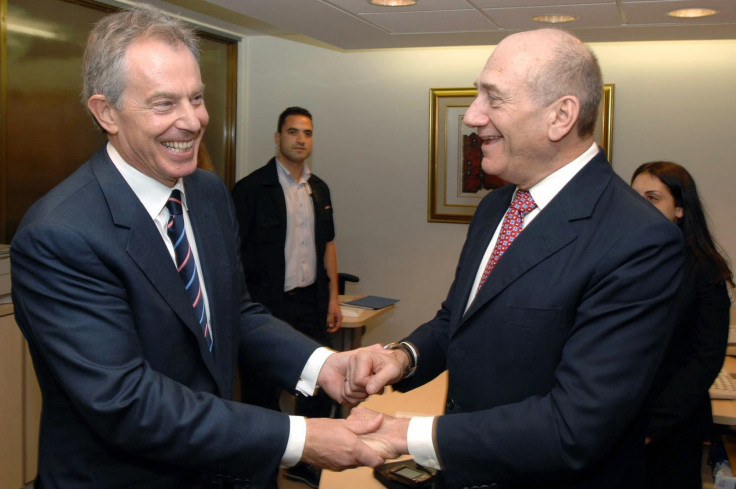Tony Blair supports Israeli former prime minister Ehud Olmert at corruption sentencing hearing

British former prime minister Tony Blair has come to the aid of Israel's former premier minister Ehud Olmert in a letter featured by Olmert's defence team during the politician's corruption trial at a court in Jerusalem on Tuesday 5 May.
In a re-trial on 30 March, the Jerusalem District Court found Olmert guilty of accepting bribes, two years after he was cleared of the same charges.
The court said the politician had accepted about $153,950 (£103,000) from American businessman Morris Talansky while serving as a Cabinet minister.
Jerusalem judges subsequently convicted him on charges of fraud and breach of trust.
The conviction marked the spectacular downfall of a statesman who once hoped to go down in history for putting an end to the conflict with the Palestinians.
Blair: Olmert should be 'admired'
The defence brought character witnesses, including Blair and security officials such as ex-Mossad chief — and a business partner of Olmert's — Meir Dagan.
In the letter, Blair lauded the Israeli politician's character and called for his "efforts to bring peace" to be "admired".
Blair's letter also highlighted Olmert's commitment to "ensuring that Israel was protected," but noted his appreciation that "peace was an indispensable part of such protection".
המכתב של טוני בלייר לשופטים pic.twitter.com/DxmGtAOEs1
— Revital Hovel (@RevitalHovel) May 5, 2015In 2008, Olmert, who was already facing the same corruption probe, compared himself with Blair, saying the way the former British leader emerged from the cash-for-honours scandal gave him hope.
"I look at the manner in which my friends Tony Blair and Silvio Berlusconi were in a similar situation," Mr Olmert said at the time.
"They were accused in similar ways, one of trading contributions for titles and one for trying to bribe a judge. They were cleared entirely and didn't stop taking care of the state."
In 2007, when Blair stepped down as prime minister and was then appointed special envoy for the Middle East, Olmert described him as "a true friend of the State of Israel".
Facing up to five years in prison
Although the conviction can carry up to five years in prison because Olmert's was for fraud under "aggravated circumstances", the prosecution has so far only asked for a custodial sentence of eight to 18 months despite the large sums of money involved in the "cash envelopes affair" and his position as a minister at the time of the alleged crime.
Meanwhile, the former premier minister faces another six-year prison sentence in a separate bribery case for accepting pay-offs in a trial linked to a massive real-estate development in Jerusalem when he was mayor.
Olmert has appealed to the Supreme Court.
© Copyright IBTimes 2024. All rights reserved.






